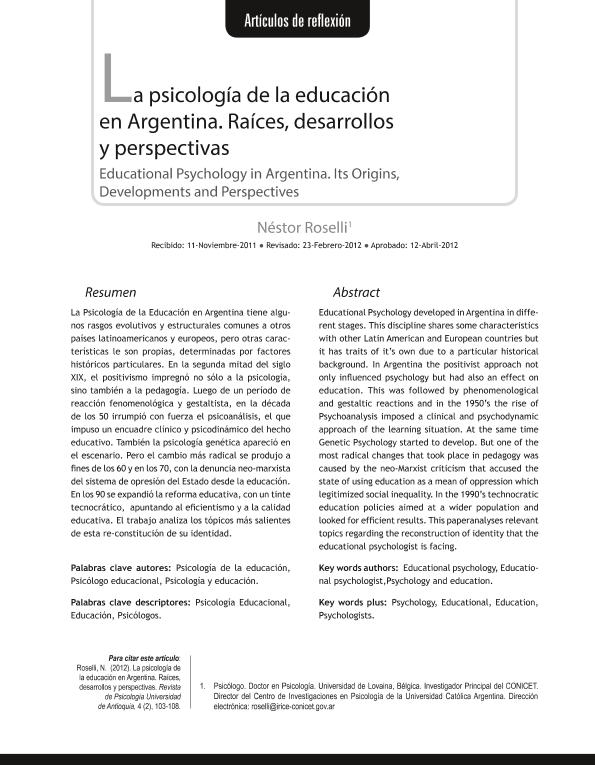Mostrar el registro sencillo del ítem
dc.contributor.author
Roselli, Nestor Daniel

dc.date.available
2017-08-07T18:40:59Z
dc.date.issued
2012-07
dc.identifier.citation
Roselli, Nestor Daniel; La psicología de la educación en Argentina: raíces, desarrollos y perspectivas; Universidad de Antioquía; Revista de Psicología; 4; 2; 7-2012; 16-27
dc.identifier.issn
2145-4892
dc.identifier.uri
http://hdl.handle.net/11336/21957
dc.description.abstract
La Psicología de la Educación en Argentina tiene algunos rasgos evolutivos y estructurales comunes a otros países latinoamericanos y europeos, pero otras características son sin duda propias, determinadas por factores históricos particulares. La psicología emerge como disciplina autónoma de la mano del amplio movimiento positivista que dominó el pensamiento occidental en la segunda mitad del siglo XIX. En Argentina el positivismo impregnó no sólo a la psicología, sino también a la pedagogía. La psicometría tuvo su auge, y estuvo dirigida sobre todo a medir la inteligencia y las aptitudes, lo primero para homogeneizar los grupos escolares, y lo segundo para orientar vocacionalmente. Luego de un período de reacción fenomenológica y gestaltista, en la década de los 50 irrumpe con fuerza el psicoanálisis, el que impuso un encuadre clínico y psicodinámico del hecho educativo. También la psicología genética aparece en el escenario. Pero el cambio más radical se produce a fines de los 60 y en los 70, con la denuncia neo-marxista del sistema de opresión del Estado desde la educación, legitimando las desigualdades sociales. El psicólogo, por lo tanto, debía adoptar un rol activo y de oposición frente a estos mecanismos institucionales de colonización simbólico-cultural. En los 90 se expande la reforma educativa, con un tinte tecnocrático, apuntando al eficientismo y a una determinada concepción de la calidad educativa; el psicólogo de la educación pasó a tener un rol importante en el contexto de este intento de mejoramiento del sistema educativo. El fracaso de este intento reformista coloca en la actualidad al psicólogo de la educación en un período de redefinición de su profesionalidad y de su práctica. La ponencia analiza los tópicos más salientes de esta re-constitución de su identidad.
dc.description.abstract
Educational Psychology developed in Argentina in different stages. This discipline shares some characteristics with other Latin American and European countries but it has traits of it’s own due to a particular historical background. Psychology defined itself as an independent science influenced by the positivist tradition that ruled western thought in the second half of the nineteenth Century. In Argentina the positivist approach not only influenced psychology but had an effect on education as well. Hence, the flourishing of psychometrics led to measure intelligence and abilities in order homogenize class groups and provide vocational counseling. This was followed by phenomenological and gestaltic reactions and in the 1950’s the rise of Psychoanalysis imposed a clinical and psychodynamic approach of the learning situation. At the same time Genetic Psychology started to develop. But one of the most radical changes that took place in pedagogy was caused by the neo-Marxist criticism that accused the state of using education as a mean of oppression which legitimized social inequality. Consequently the psychologist was meant to take an active role that would oppose to these institutional mechanisms of symbolic and cultural colonization. In the 1990’s technocratic education policies aimed at a wider population and looked for efficient results. These policies were framed in a particular view on the quality of education. The educational psychologist played an important role in this scenario which tried to improve the educational system. The failure of this attempt places the educational psychologist at a current time where he has to redefine his practice. This paper analyses relevant topics regarding the reconstruction of identity that the educational psychologist is facing
dc.format
application/pdf
dc.language.iso
spa
dc.publisher
Universidad de Antioquía
dc.rights
info:eu-repo/semantics/openAccess
dc.rights.uri
https://creativecommons.org/licenses/by/2.5/ar/
dc.subject
Psicología Educacional
dc.subject
Psicología
dc.subject
Educación
dc.subject.classification
Otras Psicología

dc.subject.classification
Psicología

dc.subject.classification
CIENCIAS SOCIALES

dc.title
La psicología de la educación en Argentina: raíces, desarrollos y perspectivas
dc.title
Educational psychology in Argentina. Its origins, developments and perspectives
dc.type
info:eu-repo/semantics/article
dc.type
info:ar-repo/semantics/artículo
dc.type
info:eu-repo/semantics/publishedVersion
dc.date.updated
2017-07-17T13:45:15Z
dc.identifier.eissn
2256-1102
dc.journal.volume
4
dc.journal.number
2
dc.journal.pagination
16-27
dc.journal.pais
Colombia

dc.journal.ciudad
Medellín
dc.description.fil
Fil: Roselli, Nestor Daniel. Consejo Nacional de Investigaciones Científicas y Técnicas. Centro Científico Tecnológico Conicet - Rosario. Instituto Rosario de Investigaciones en Ciencias de la Educación. Universidad Nacional de Rosario. Instituto Rosario de Investigaciones en Ciencias de la Educacion; Argentina
dc.journal.title
Revista de Psicología
dc.relation.alternativeid
info:eu-repo/semantics/altIdentifier/url/http://aprendeenlinea.udea.edu.co/revistas/index.php/psicologia/article/view/15484
Archivos asociados
